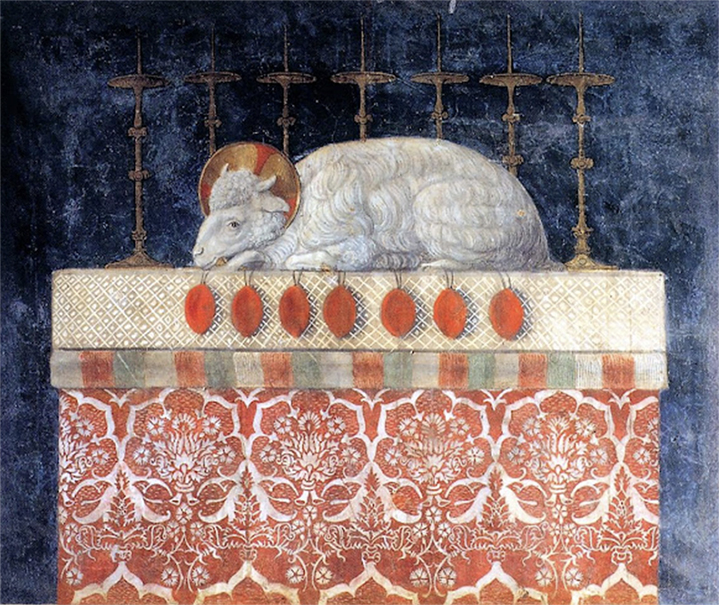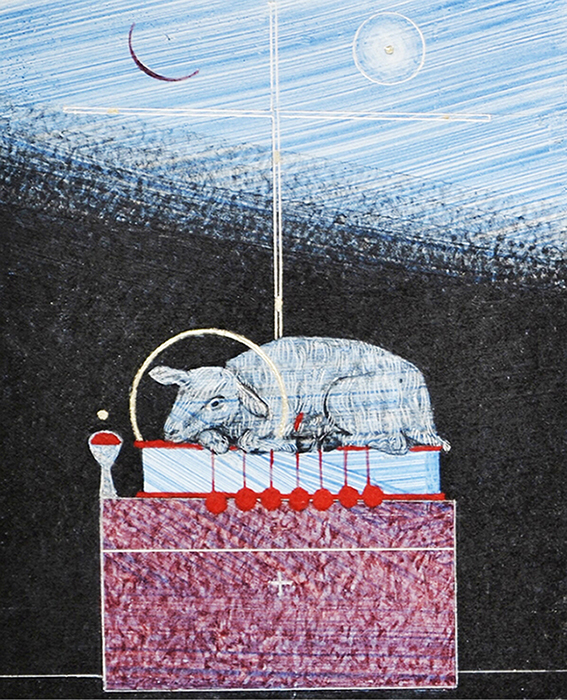Last Words: A Lenten Meditation on the Final Sayings of Christ, Week 7Sample

A Once-for-All Sacrificial Lamb

The Mystic Lamb, Benozzo Gozzoli, 1459–60. Fresco. Palazzo Medici Riccardi Chapel, Florence, Italy. Public domain.

Revelation, Kateryna Kuziv, 2023. Egg tempera and gilding on gessoed wood panel. Private Collection.
“Angus Dei” from the album Enchanted Isle. Composed by Samuel Osmond Barber II. Performed by VOCES8.
Poetry:
“None Other Lamb”
by Christina Rossetti
None other Lamb, none other Name,
None other hope in Heav’n or earth or sea,
None other hiding place from guilt and shame,
None beside Thee!
My faith burns low, my hope burns low;
Only my heart’s desire cries out in me
By the deep thunder of its want and woe,
Cries out to Thee.
Lord, Thou art Life, though I be dead;
Love’s fire Thou art, however cold I be:
Nor Heav’n have I, nor place to lay my head,
Nor home, but Thee.
A ONCE FOR ALL SACRIFICIAL LAMB
Our Scriptures today are full of echoes. Both the Hebrews passage and the 1 Peter passage use the phrase “the foundation of the world.” Hebrews tells us what did not have to be repeated many times since the world was founded; Peter tells us what did happen before the world was founded.
Christ did not have to be sacrificed over and over and over, from the foundation of the world till now.
But His one sacrifice of Himself was always the plan —even before the foundation of the world.
Which explains why the sacrifices commanded in Leviticus were able to foreshadow Christ’s own sacrifice: because when God gave the command for those acts of worship, He already knew what they meant.
This is a comfort to us as Christians: we can be sure that it is okay for us to read the Old Testament seeking to learn about Christ. Truth about Jesus Christ really is present in the text of Leviticus—and of the Psalms, and of the histories, and of the prophets, and of all the rest. It’s such a gift when a passage like this one from Hebrews makes this clear to us.
It is also a gift to know that the Lord has always cared for us. Always. Since before the foundation of the world.
So, in Leviticus we read of the sacrifice of a lamb, as part of the offering of a leper who is cleansed. And this is far from the only place in Leviticus where a lamb, an unblemished lamb, is offered to the Lord. It was a regular sacrifice—made over and over.
But the sacrifice of Jesus, as the writer of Hebrews points out, was a once-for-all sacrifice—never to be repeated. It didn’t need to be repeated because it was a perfect sacrifice. Jesus, as Peter points out, was not a corruptible, earthly sort of a thing. He is more precious than that. He is also not a copy of a heavenly thing—He is the Lord of both heaven and earth.
He is also a lamb. He was meek and bowed His head to the task set before Him. Both pieces of art help us with a picture of what a meek lamb looks like—and yet an earthly lamb is just a copy of the heavenly reality.
Still, the art helps us. Because we are earthly, and earthly things can give us ideas of what the heavenly reality is.
Another way the art helps us—and I think this is especially clear in both the poem and the music—is that they help us know not just how to think, but how to feel. It is possible to have a wrong emotional reaction to something. We all have seen someone young or immature laugh at something that’s not funny—at someone falling, or a friend embarrassing herself. Our emotions, as well as our beliefs, are in need of good formation.
Listening to Barber’s piece helps us feel how beautiful Christ’s sacrifice was. That music lifts us up towards the heavens.
That uplifted feeling is a good and proper emotional reaction to the absolute glory of Christ’s sacrifice. It is wonderful. It is awesome. It should leave us in silent astonishment and gratitude, that He would love us enough to do that on our behalf.
And reading Rossetti’s poem as a prayer helps us bring a proper response up out of the homely place of our hearts. “My faith burns low, my hope burns low…my heart’s desire cries out…to Thee.”
O the weight of our sins! O how we stumble and are bowed down by our own foolishness, by the utter wreck we’ve made of things! And yet, and yet…there is Jesus, the Lamb of God, meekly carrying the weight of sins that we cannot carry, and then utterly destroying it, canceling the debt, lifting the burden from our shoulders forever, and leaving it in the grave that He did not stay in.
And that, thanks to Him, will never be able to hold us either.
Rossetti’s poem prompts us to lift our eyes to Him: “Lord, Thou art life; though I be dead; / Love’s fire Thou art, however cold I be: / Nor Heav’n have I, nor place to lay my head, / Nor home, but Thee.”
We lift our eyes, our hearts, and our petitions to Him who is the Lamb of God, the Lamb who takes away the sin of the world, the Lamb who is also the Shepherd, who will appear a second time, to those who eagerly await Him, and who will take them home to be with Him forever.
Thanks be to God!
Prayer
Soul of Christ, sanctify me. Body of Christ, save me. Blood of Christ, inebriate me. Water from the side of Christ, wash me. Passion of Christ, strengthen me. O good Jesus, hear me. Within thy wounds hide me. Permit me not to be separated from thee. From the wicked foe defend me. In the hour of my death call me, and bid me come to thee, that with thy saints I may praise thee for ever and ever.
Amen.
—the Anima Christi prayer, as found in the ACNA Book of Common Prayer, 2019
Jessica Snell
Writer and Editor
Alumna of Biola University
About this Plan

The Lent Project is an initiative of Biola University's Center for Christianity, Culture and the Arts. Each daily devotion includes a portion of Scripture, a devotional, a prayer, a work of visual art or a video, a piece of music, and a poem plus brief commentaries on the artworks and artists. The Seven Last Words of Christ refers to the seven short phrases uttered by Jesus on the cross, as gathered from the four Christian gospels. This devotional project connects word, image, voice and song into daily meditations on these words.
More
We would like to thank Biola University for providing this plan. For more information, please visit: https://ccca.biola.edu/lent/2025
Related Plans

Forgive Them Too??

Creating to Heal: 7 Days of Healing Through Art & Prayer

Adventure in Evangelism

Cornerstone: Rebuild, Renew, Restore

Not Giving Into Fear and Peer Pressure: Devotions for Girls (I Am Fearless)

When God Is Silent: Finding Faith in the Waiting

Who Is Jesus?

Jesus Never Said ‘Hustle’: Finding True Rest in a Burnout World

Be Ye Holy: The Holy Spirit's Role in Our Lives
